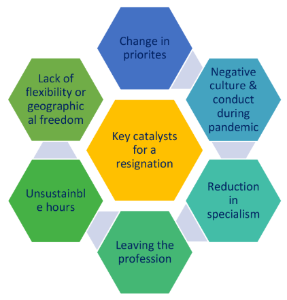As we start to recover and adapt to life beyond the pandemic, many firms are beginning to cautiously plan for the future. Thankfully, all our clients survived the short-term tumult that the pandemic brought to the legal profession, and some even thrived during this period. Despite this, the whole of the legal industry has seen an increase in staff turnover – an issue that remains a mystery to many firms.
Data from numerous sources suggests that the legal profession has remained fairly stable during the pandemic, especially when compared with other UK services. The Office of National Statistics noted in its monthly survey that the annual turnover of legal services in the UK in 2020 remained the same as in 2019, where other UK services dropped by 14%. Some experts predict that there will be an unprecedented demand for legal services following the pandemic – meaning that 2021 figures could be even higher.
So why is staff turnover on the rise?
Pre-pandemic, the legal profession tended to employ fairly traditional working practices, and it could be said that the industry was resistant to change. However, Covid-19 has transformed our collective way of working – perhaps irrevocably. Working from home with virtual meetings is now par for the course, which allows for greater flexibility, more choice of residential location and increased autonomy for employees.
 These changes to the working landscape, temporary or otherwise, appears to be a catalyst for legal professionals to assess their current employment. Pre-pandemic, the main reasons for leaving a law firm were likely to be: pay, mergers or defocus. Now, however, employees tend to have wider considerations when it comes to employment options, namely: cultural fit, specialism, flexibility and geographical freedom. Some of these reasons are illustrated in the graphic.
These changes to the working landscape, temporary or otherwise, appears to be a catalyst for legal professionals to assess their current employment. Pre-pandemic, the main reasons for leaving a law firm were likely to be: pay, mergers or defocus. Now, however, employees tend to have wider considerations when it comes to employment options, namely: cultural fit, specialism, flexibility and geographical freedom. Some of these reasons are illustrated in the graphic.
While the pandemic has opened up greater geographical flexibility to employees in the industry, many are choosing to leave existing roles due to the negative impacts of remote working.
From trainees and support staff, to partners, home-working is cited as a catalyst for leaving a role by staff at all levels in a firm. The Gazette reported that “staff at firms in different parts of the country have reported confidentially that they fear for their safety because bosses do not trust them to work remotely”.
Law Care, a dedicated support organisation for lawyers has spoken up behalf of the junior lawyers, who are expressing concerns around isolation, long working hours and a lack of supervision due to remote working.
The Financial Times recently published an article on burn-out, pointing out that the longer working hours experienced by lawyers during the pandemic are “sparking fears of an exodus”.
While it is possible that this trend for lawyers and support staff to look elsewhere is only a temporary, reflexive response to the impact of the pandemic, the Association of Legal Administrators (ALA) says otherwise. According to a recent whitepaper by the entity, entitled “Remote working as an effective recruitment and retention tool for law firms post Covid-19”, this issue could be set to last in the long term. The ALA advises:
“One of the chief priorities for law firms during this challenging time should be to focus on their human capital, because people in a law firm are the law firm. When the times change for the better once again, law firms will need to implement their growth plans to achieve future business goals, which inevitably include recruitment and retention goals.”
The issue of mass resignation does pose significant risks that must be carefully managed by firms. Gaps in expertise, client retention, protection of confidential information and handover procedure are all issues that should be carefully considered by firms in order to protect their financial and reputational interests.
While it is inevitable that some employees will move, we would advise firms to be proactive in order to reduce the impact this has on operations. Below, we have outlined some key risk management strategies to help you stay ahead of the curve when it comes to staff turnover.
At Lockton, we are consistently working with our clients to reduce their employee retention risks, and would welcome the opportunity to advise you on this particular issue.
- Consider different needs for different employees i.e Trainee to a person with child care responsibilities
- Be transparent in a consultation process with employees regarding agile working
- Have clear policies with known boundaries
- Have a contingency plan for an entire team resigning , including risk and PR
- Ensure more than one fee earner has a relationship with a particular client
- Establish procedures and protocols for protection of client and firm confidential information when a lawyer leaves the firm
- Have a policy in place for the handover of clients and fee earning upon resignation
- Keep talking to employees so that discord can be spotted and managed earlier
- A purposeful exit interview can assist understanding why an employee is leaving and alert you to potential internal problems.